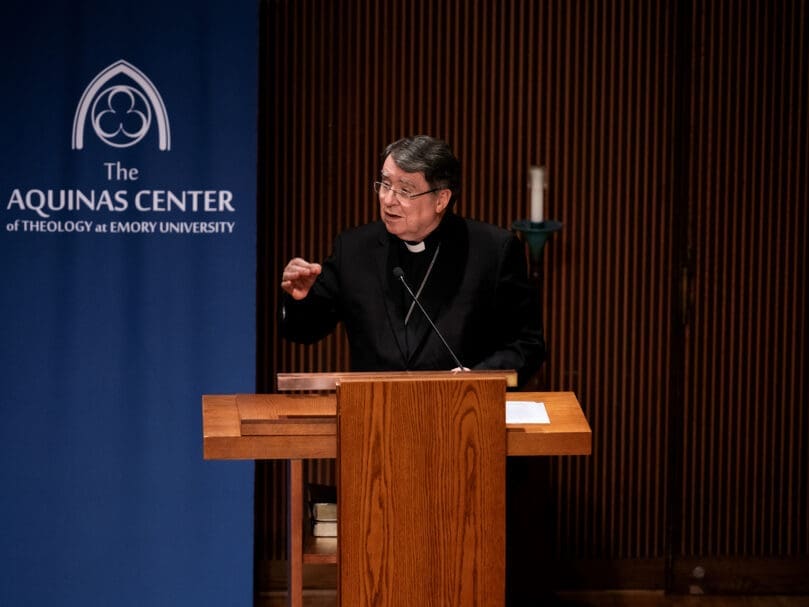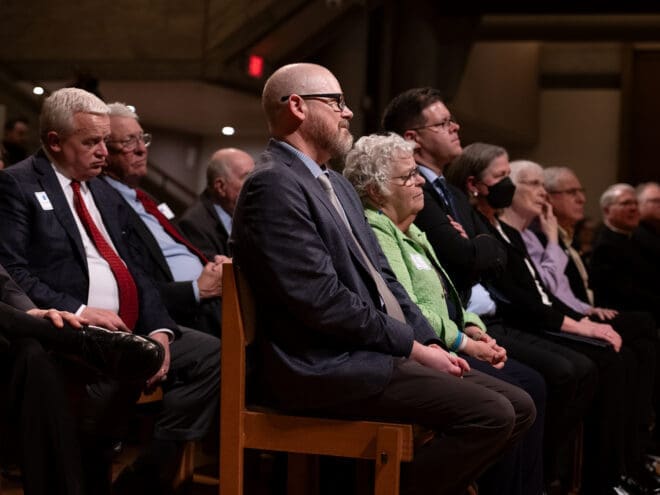 Photo by Johnathon Kelso
Photo by Johnathon KelsoAtlanta
Cardinal Pierre encourages believers to leave ‘comfort zones’ to share Gospel
By ANDREW NELSON, Staff Writer | Published March 8, 2024
ATLANTA—Pope Francis’ ambassador to the United States, Cardinal Christophe Pierre, spent his two-day visit to Atlanta chatting with students and clergy, speaking at a Hispanic mission and offering encouragement for the ongoing Synod on Synodality.
Speaking at the Cannon Chapel at Emory University on Feb. 20, Cardinal Pierre said changes in the culture and society represent an opportunity for believers to welcome an “apostolic age” in living the faith.
“It’s a chance to embrace the kind of apostolic age. We start again from scratch,” he said.
In the current era, it is as if the church proclaims the Gospel for the first time. This requires an active, intentional transmission of faith, said Cardinal Pierre, adding it demands a new way to transmit Jesus’ message to the contemporary world.
It will not work if the church is “remains closed in itself.” Cardinal Pierre said the synod’s goal is focused so “the church’s customs, ways of doing things, times and shadows, languages and structures can be suitable channels for the evangelizations of today’s world rather than for her self-preservation.”
The evening talk to the crowd was the culminating public event during a few days spent in Atlanta. The Vatican diplomat also spoke to the Hispanic congregation at Brookhaven’s Divine Mercy Mission, visited St. Pius X High School in Atlanta and celebrated Mass before sharing lunch with graduate students at the Candler School of Theology at Emory.
The Aquinas Center of Theology hosted the cardinal as part of its annual Major Catholic Speaker series.

Gregory K. Hillis, professor in the practice of theology, and executive director of the Aquinas Center of Theology, listens to the introductions before Cardinal Christophe Pierre presents his lecture at at Cannon Chapel on the campus of Emory University. Photo by Johnathon Kelso
Since 2016, Cardinal Pierre has represented the pope in the United States. He has been a diplomat for the Vatican since 1977.
In the remarks, he highlighted the synodal approach as a necessity, which, guided by the Holy Spirit, aims to bring people to encounter Christ.
“Pope Francis was calling us to look at a contemporary world, the very reality in which we are sent to proclaim the message of Jesus and upon honestly observing this world, to make a judgment, to recognize the immense changes that have occurred, and that those changes must necessarily impact the way in which we seek to transmit the Gospel in our time,” he said.
One of the biggest initiatives of Pope Francis has been organizing the global Synod on Synodality among Catholics, laity and clergy. Participants in the synod are being asked to consider some of the key issues facing the church raised by the concerns of the faithful. The synod has synthesized topics raised in conversations from around the world during the past two years. The final meeting in Rome is scheduled with a retreat followed by three-and-a-half weeks of discussions in October. A final regional listening session for the synod will be held March 18 in Atlanta and is a virtual gathering.
The Synod on Synodality is not without its critics who question if the process will lead to compromising church doctrine. In response, Cardinal Pierre said the work of the synod is not to “diminish, of course, the essential place of catechism, both moral and doctrinal.” Instead, he said there is discomfort because Pope Francis is asking people for pastoral conversion and “leaving our comfort zone and being a church that goes forward,” he said.
Quoting Pope Francis, the nuncio said, “Every person’s story has value, every person’s story has meaning. And we can only be a bridge between a person and Christ if we are willing to let that person’s story find a connection with the story of Jesus.”